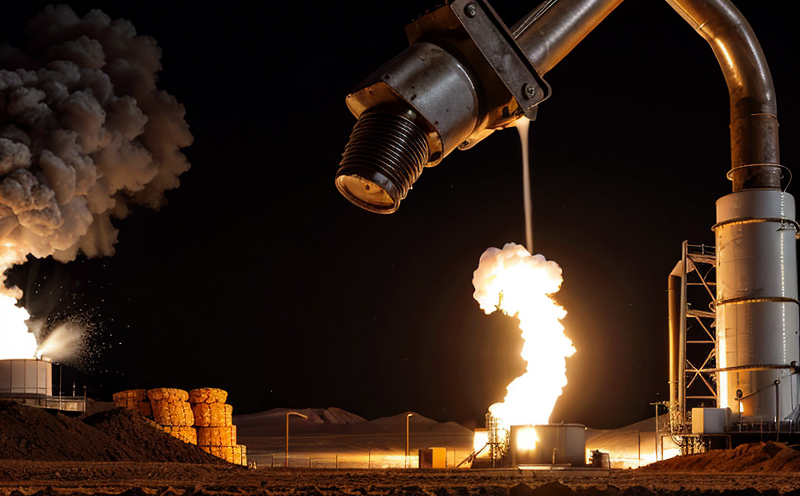ASTM D4809 Heat of Combustion Testing of Fuels for Trade
The ASTM D4809 test method is specifically designed to measure the heat of combustion of fuels intended for trade. This critical analysis helps ensure that the energy content declared on fuel labels accurately reflects the actual calorific value of the fuel. By conducting this test, laboratories can provide data that supports compliance with international standards and local regulations.
The testing procedure involves combusting a known mass of the fuel sample in a controlled environment, measuring the heat released during combustion, and using this information to calculate the higher heating value (HHV) or lower heating value (LHV). HHV is the maximum energy content available from burning the fuel completely with oxygen under standard conditions, while LHV accounts for the latent heat of vaporization of water in the fuel.
The importance of ASTM D4809 testing lies not only in ensuring accurate labeling but also in maintaining fair trade practices. When consumers or businesses purchase fuels based on declared energy content, they expect that value to be consistent with the actual amount of energy received. Inaccurate values can lead to disputes and financial losses.
The test method is widely recognized for its precision and reliability, making it a cornerstone in fuel quality assurance. Compliance with ASTM D4809 is particularly crucial for industries dealing with international trade, where discrepancies between declared and actual heating value could result in significant economic consequences.
In this service, our laboratory adheres to the strict requirements of ASTM D4809, ensuring that every test is conducted under controlled conditions and using calibrated equipment. The results are reported according to the standards set by ASTM, providing clients with a reliable and trusted source of data.
Why It Matters
The accuracy of fuel heating value is crucial for several reasons:
Ensures fair trade practices by guaranteeing that the energy content declared on fuel labels matches the actual calorific value.
Aids in regulatory compliance, particularly important for international trade where standards vary between countries.
Facilitates accurate billing and invoicing, reducing disputes over fuel quality and quantity.
Supports the development of new fuels by providing precise data on their energy content.
Inaccuracies in heating value can lead to financial losses for both buyers and sellers. For instance, a discrepancy between declared and actual heating value could result in overpayment or underperformance of fuel delivery contracts. This is especially problematic in sectors where precise energy measurement is critical, such as aviation, shipping, and power generation.
By adhering strictly to ASTM D4809 standards, our laboratory ensures that the data provided is reliable and can be trusted by all parties involved in fuel trade.
Benefits
Ensures accurate energy content labeling for fuels intended for international trade.
Aids in compliance with national and international standards, enhancing trust between buyers and sellers.
Promotes fair trade practices by eliminating discrepancies that could lead to disputes over fuel quality and quantity.
Supports the development of new fuels by providing precise data on their energy content.
The precision and reliability of ASTM D4809 testing can significantly enhance the reputation of both suppliers and buyers in the global fuel market. It helps build trust between trading partners, ensuring that all parties are working with accurate and consistent data.
Use Cases and Application Examples
| Use Case | Description |
|---|---|
| Aircraft Fuel Testing | Determine the energy content of jet fuel to ensure compliance with aviation regulations. |
| Oil Export Compliance | Measure the heating value of crude oil exports to meet international trade standards. |
| Shipping Industry Quality Control | Ensure that marine diesel meets specified energy content for efficient operations and compliance. |
| New Fuel Development | Develop new fuel blends by measuring their heating value in comparison with established fuels. |
Aircraft operators require precise fuel quality testing to ensure safe and reliable flights. ASTM D4809 helps them meet stringent aviation regulations.
Oil companies must adhere to international trade standards when exporting crude oil. This ensures that the energy content declared on export documents matches the actual value, preventing disputes with importers.
The shipping industry relies on marine diesel for operations. Ensuring compliance with fuel specifications is crucial for efficient and safe operations.
Developing new fuels involves extensive testing to ensure that they meet or exceed existing standards in terms of energy content and performance.
In these cases, ASTM D4809 testing plays a vital role by providing accurate data on the heating value of various fuel types. This ensures compliance with regulatory requirements and supports fair trade practices across different sectors.





